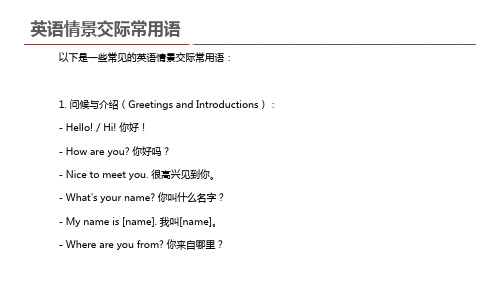近三年情景交际用语总结
- 格式:doc
- 大小:135.00 KB
- 文档页数:2



1. All right. 好的,行的。
That's all right. 没关系,不用谢。
(可回答Thank you.和I'm sorry.)That's right. 那是对的。
2. With pleasure.=Yes/Certainly. “当然可以;愿意效劳。
”类似的答语还有:All right;OK;No problem;I'd like to.等,主要用于对别人的请求表示乐意去做。
It's a pleasure.=A pleasure.=My pleasure. “不用谢;没关系;这是我乐意做的”通常是对thank you 的回答。
3. “祝愿;祝贺”类①当听到令人高兴的事时,常用I…m glad to hear that.应答;否则用I‟m sorry to hear that.应答。
②当对方向你表示祝愿时,常用The same to you.或You, too.回答。
但对Happy birthday to you的回答常用Thank you.③当对方在参加某项活动,如考试、比赛时,向对方表示祝福用Good luck.④当对方在某方面取得成就或成功时,常用Congratulations!来表示祝贺。
4. Go ahead.表示鼓励对方做某事,意为“请吧;请说吧;请开始吧;请尽管用…”注意:在回答May I use…或I wonder ifI can use…时,如借用的东西可以拿走,就用Here you are.或者用Go ahead. Help yourself.可表示“请随便吃、喝”外,还可表示“请自己动手做……或拿……。
”5. How come? 怎么会这样?询问事情发生的过程。
What if? 倘若……会怎么样?询问假设成立,将会有什么样的结果。
What for? =What is sth. for? 询问“某物是做什么用的?”So what? 那又怎么样?表示不屑、轻蔑。

一、基础知识1、表示问候(1)表示问候:打招呼时常用的句子,如:Hi,Hello,Good morning,Good afternoon,Good evening, How are you? ,Nice to meet you等。
(2)回答问候:回答打招呼时常用的句子,如: Hi,Hello,Good morning,Good afternoon,Good evening,I'm fine,Nice to meet you,Nice to see you等。
2、表示相识(1)表示相识:表示已经相识的句子,如: It's a pleasure tomeet you,It's nice to meet you,It's been a while等。
(2)回答相识:回答表示相识的句子,如: Nice to meet you too,Nice to hear from you,It's my pleasure等。
3、表示礼貌(1)表示礼貌:用来表示礼貌的句子,如:Please,Thank you,Excuse me,I'm sorry,Thank you for your help等。
4、请求帮助(1)表示请求帮助:用来请求帮助的句子,如:Could you help me,Please help me,Can I ask you something?,Can you do me a favor?等。
(2)回答请求帮助:回答表示请求帮助的句子,如:Yes,Sure,What can I do for you?,I'll be glad to help,No problem等。
5、邀请(2)回答邀请:回答表示邀请的句子,如:Yes,I'd love to,Sure,I'd be happy to,No problem等。
6、表示感谢(1)表示感谢:用来表示感谢的句子,如:Thank you,Thanks a lot,Thank you for your help,I really appreciate it等。

盘点情景交际用语————————————————————————————————作者: ————————————————————————————————日期:ﻩ盘点情景交际用语高考中的情景交际题是在特定的语言环境中考查考生运用语言的能力,但由于受到中西方文化不同思维方式的影响,或只单纯地考虑语法规则而忽视礼貌得体原则,结果往往选错答案。
结合较历年高考试题,将常见的情景交际用语归纳如下:一、“没关系;不要紧;没问题;别提了…”类⒈Never mind意为“没关系;不要紧;不用费事”,常用于以下几种场合:1)当别人向你致歉时;2)请对方放心或安慰对方时注意:由于受字面意思的影响,很多学生把Never mind用于对Do\Would you mind…的否定回答。
对Do\Would you mind…表示“不介意”时常用No,notat all;ofcourse not;certainly not;No, please;No,go ahead等;表示“介意”的回答为Youhad better not;You’drather not;I’mafraid…not;I’m sorry,but…等。
⒉Forget it 意为“没关系;不要紧;别提了”,通常用于以下场合:1)当别人向你致歉时;2)不同意对方要求的委婉拒绝⒊No problem意为“没问题;成”。
通常用于对别人的请求表示同意。
类似的表达还有:All right;OK。
⒋Itdoesn’t matter相当于No matter,意为“没关系;不要紧”,通常用于对别人道歉的答语。
高考链接:①-----Wouldyou mindmy coming and having a look at yournewgarden?Mylittleson’scuriousabout roses you grow。
-----_______。
You’re welcome。

情景交际考前必背汇总考点主题一、表达感谢: Thank you. /Thank you very much. / Thanks a lot.他人虽然没有帮上忙,但仍然要感谢他:Thank you all the same回答感谢的用语: You are welcome. / Not at all. / That’s OK.二、表达道款:Sorry./ I’m sorry.回答道款的用语: It's nothing. /That’s OK./ That’s all right三、表达邀请: (共进晚餐) Would you like to have a dinner with?(参加晚会)May I invite you to the party?应答(接受邀请): Yes, I’d like to. (拒绝邀请): No, thanks.四、寻求帮助:Could you help me?应答(背定):Sure. / Of course. (否定):Sorry, I can’t help you.五、提供帮助: (服务性行业用语)Can I help you? / What can I do for you?应答(肯定):Yes,please. (否定):No,thanks.六、祝愿/祝贺: Well done! / Good job! / Have a good trip!/ Have a good time.Good luck to you! / Happy birthday!应答: Thank you.特殊(公共节日):- Happy New Year. -The same to you七、请求允许①:Can / May/ Could I park here?(是否能停车?)应答(肯定):Yes, please./Sure./ Of course, you can.应答(否定):No,please don’t. / I’m sorry you can’t.请求允许②: Would you mind my smoking here?不介意: Of course not./ Not at all. 介意: I’m sorry you can’t.八、就餐与应答征求对方意见:(询问吃不吃?)Would you like something to eat?Would you like eggs? 回答:(吃)Yes, please.(不吃)No, thanks. (吃饱了) I’m full, thank you.征求对方意见:(询问吃什么?)What would you like to have?回答:I’d like some fish and rice. / I’d like some milk.请客人随意: Help yourself.九、表达建议:(以建议去游泳为例)What about going swimming with me ?/How about going swimming with me? / Why not go swimming with me ?回答: Good idea. / All right. / OK.十、表达遗憾: It’s a pity. / What a pity!表达同情: I’m sorry to hear that.十一、打电话方: May/ Could I speak to Kangkang?/Is that Kangkang ( speaking)?接电话方: Speaking. / This is Jane speaking.请稍等:Hold on , please.要找的人不在:Sorry, he (she) isn’t here right now.十二、禁止、警告:You mustn’t play football on the street. / Don’t play on the road.答语:Sorry, I won’t.。
情景交际用语⏹高考中的情景交际题是在特定的语言环境中考查考生运用语言的能力,但由于受到中西方文化不同思维方式的影响,或只单纯地考虑语法规则而忽视礼貌得体原则,结果往往选错答案。
结合比较历年高考试题,将常见的情景交际用语归纳如下:一、“没关系;不要紧;没问题;别提了…”类⏹⒈Never mind意为“没关系;不要紧;不用费事”,常用于以下几种场合:1)当别人向你致歉时;2)请对方放心或安慰对方时⏹注意:由于受字面意思的影响,很多学生把Never mind用于对Do\Would you mind…的否定回答。
对Do\Would you mind…表示“不介意”时常用No, not at all;of course not;certainly not;No, please;No,go ahead等;表示“介意”的回答为You had better not;You’d rather not;I’m afraid…not;I’m sorry,but…等。
⏹⒉Forget it 意为“没关系;不要紧;别提了”,通常用于以下场合:1)当别人向你致歉时;2)不同意对方要求的委婉拒绝⏹⒊No problem意为“没问题;成”。
通常用于对别人的请求表示同意。
类似的表达还有:All right;OK。
⏹⒋It doesn’t matter相当于No matter,意为“没关系;不要紧”,通常用于对别人道歉的答语。
高考链接:⏹①-----Would you mind my coming and having a look at your new garden?My little son’s curious about roses you grow。
-----_______。
You’re welcome。
AYes, I do B.Never mind C.Yes, please D. Not at all⏹②-----I don’t have any change with me。
初中英语情景交际归纳:初中英语情景交际是指在各种日常生活场景下,通过口语交流来表达自己的想法、需求和情感。
以下是一些常见的初中英语情景交际归纳:1. 问候与介绍- How are you?(你好吗?)- What's your name?(你叫什么名字?)- Nice to meet you.(很高兴认识你。
)- This is my friend, Sarah.(这是我的朋友,萨拉。
)2. 打电话- Hello, may I speak to John?(你好,我可以和约翰通话吗?)- Can I take a message?(我可以传个口信吗?)- Sorry, he's not in right now.(抱歉,他现在不在。
)- Could you please ask him to call me back?(请问你能告诉他给我回个电话吗?)3. 购物- How much does this T-shirt cost?(这件T恤多少钱?)- Can I try it on?(我可以试穿一下吗?)- Do you have this in a different color?(这个有其他颜色吗?)- I'll take two, please.(我要买两个,请。
)4. 饭店用餐- Do you have a reservation?(您预订了吗?)- May I see the menu, please?(请给我看看菜单。
)- I'd like a table for four, please.(我想要一个四人桌。
)- Can I have the bill, please?(请给我账单。
)5. 学校场景- What's your favorite subject?(你最喜欢的科目是什么?)- How do you get to school?(你怎么去学校?)- Can I borrow your pen?(我可以借你的笔吗?)- Do we have any homework tonight?(今晚有作业吗?)6. 请求帮助- Excuse me, can you help me find the library?(打扰一下,你能告诉我图书馆在哪里吗?)- Could you please lend me a hand?(请问你能帮我个忙吗?)- I'm sorry, I don't understand. Can you explain it again?(对不起,我不明白。
中考英语情景交际知识归纳1.Thank you.谢谢你. You are welcome./That’s all right./Not at all./ It’s my pleasure/It’s a pleasure/My pleasure.不客气.2.I’m sorry.对不起. It doesn’t matter./That’s all right. /Not at all./Never mind.没关系.注意:That’s all right.和Not at all既可以表示“不客气”,也可以表示“没关系”。
That’s right.意思是“那是对的”,不同于That’s all right.3.购物交际英语:Can I help you?你想要买什么?Yes,please.I want to buy…/I would like to buy…/I’m looking for…我想要买……What size do you want/need?你想要多大尺寸?What color do you want/need?你想要什么颜色?What/How about this one?这个怎么样?Do you have any other colors?你有一些其他的颜色吗?Can I try it on?我可以试穿一下吗?How much is it?/How much are they?它多少钱?/它们多少钱?Can it be a little cheaper?能便宜点吗?I’ll take it.Here is the money.我将买下它,给你钱。
4.别人要去参加考试了,你应说:Good luck (to you).“祝你好运”5.别人要去旅行了你应说:Have a good time./Have fun/Have a good trip.“祝你旅途愉快”6.当别人说Have a good time./Have fun/Have a good trip时,你应说Thank you.7.提建议的句型有:Let’s do….=Shall we do…?“让我们……。
情景交际用语知识点总结一、问候与介绍1. 问好- Hello, how are you?- Hi, how’s it going?2. 自我介绍- Let me introduce myself. I’m Anna.- Hi, I’m David. Nice to meet you.3. 问候朋友- How have you been?- Long time no see. How are you doing?4. 介绍朋友- This is my friend, Mike.- Have you met my colleague, Sarah?二、打招呼与道别1. 打招呼- Good morning/ afternoon/ evening.- Hey, how’s everything?2. 道别- See you later.- Goodbye, take care.三、请求与允许1. 请求- Could you please help me with this?- Would you mind passing me the salt?2. 允许- Sure, no problem.- Of course, go ahead.四、感谢与回应1. 表示感谢- Thank you so much for your help. - I really appreciate it.2. 回应- You’re welcome.- No problem, glad to help.五、表达喜欢与不喜欢1. 喜欢- I really like this restaurant.- I’m a big fan of jazz music.2. 不喜欢- I don’t care for spicy food.- I’m not too keen on horror movies.六、表达赞同与不赞同1. 赞同- I totally agree with you.- That’s a great idea.2. 不赞同- I’m not sure I agree with that.- I’m afraid I have to disagree.七、请求和提供帮助1. 请求帮助- Could you please help me carry this?- Can you give me a hand with this?2. 提供帮助- Let me help you with that.- Do you need any assistance?八、询问与解释1. 询问- Could you tell me how to get to the nearest bank? - Do you know where the restroom is?2. 解释- That’s a long story, let me explain.- Let me clarify what I meant.九、道歉与原谅1. 道歉- I’m really sorry for being late.- Please forgive me for my mistake.2. 原谅- It’s okay, don’t worry about it.- I forgive you, no hard feelings.十、讨论和商议1. 讨论- Let’s discuss the details of the projec t.- I’d like to talk about our plans for next week.2. 商议- Let’s negotiate a better deal.- Can we come to an agreement on this issue?十一、祝福与祝愿1. 祝福- Best wishes on your birthday.- Good luck with your new job.2. 祝愿- I hope you have a great time at the party.- I wish you all the best in your future endeavors.。
近三年情景交际用语总结
Why not译为“为什么不去做……”用于向别人提建议,Keep it up坚持下去
I hope so\not译为“我也希望是这样”,I am afraid not译为“恐怕不行”as the old saying goes
What is it?意思是“什么事?”。
You're not alone不仅你这样I’ll make sure you get one
Great minds think alike.
Two heads are better than one.
A bird in the hand is worth two in the bush.
It’s better to think twice before doing something.
It doesn’t hurt to ask意为“又不是不能问;问一下也无妨”;
It takes no time意为“这不花时间”。
Would you like me to give you a lift? ask sb. for a lift
That would be great ! 太棒了!
Would you please do…. ?是一个表示请求的句型,对该句型的回答,肯定回答用:Sure. /Certainly. /Of course. / By all means. / Yes, do please. / Here you are. / Help yourself. (可以/当然/拿去/请便。
)
否定回答用:I’m afraid…(我恐怕……)I’m sorry, but…(对不起,但是……)I’m sorry I can’t. /You’d better not. (很抱歉,不行。
/你最好别这样。
)
Don’t mention it. No problem. No way. With pleasure.(帮忙前用语)
no wonder well done “Go ahead”译为“做吧””So what? 表示“那又怎么样?
What for?表示“为了什么?”;No doubt by no means It depends.
I’d rather not我宁愿不Have a nice time:祝你玩的高兴;pardon me:原谅我;that’s great:那太好了;
you are right:你说的对; not really “委婉说不”; I’m not surprised. 一点也不奇怪。
Not likely!(大概)不会,不可能。
Sooner or later Once in a while To be exact 准确来说;= or rather
Believe it or not It’s up to you The same to you
You,too你也是Me,too.我也是Me neither我也不I can manage without you.(缺你也行).
I can manage it myself All right That’s right It’s all right There’s no way What a relief Congratulations
you are welcome I have no idea It’s not the case
in that case 如果那样 Not exactly 不准确 you name it<口>凡你想得起的不管什么(都有了或
都干了等) I've got it和I got it我已经懂了。
我明白了/。
还有you got it与you've got it。
你
明白了。
你已经懂了
what's up[wɒts ʌp]怎么了,发生什么啦?;近来如何?
no kidding(用以强调陈述的真实性)不开玩笑,说真的well,not quite 并不完全
why bother?何必呢何苦呢没必要
---“Shall I wait?”---…No, don‟t bother”-要我等一下吗?--不,别费事了
--I‟m sorry he was so rude to you. ---It doesn‟t bother me. 没关系
---where shall we eat? ----I‟m not bothered. 随便
Guess what?你猜怎么着?Never again再也不了That’s for sure
I’m pleased to know that That is no trouble不麻烦
I really envy you That’s ok. No hurry. = Take your time Cheer up
not yet:还没有
not a little 和not a bit 有什么区别; not a bit= not at all
-Do you mind if i smoke here?
-Not a bit. Do, please.
一点也不。
请吧。
not a little:
ad. 不少(很多) Examples: 1. I am so sorry to give you not a little t rouble. 真抱歉给你添了这么多麻烦。
With pleasure & my pleasure:
在英语中对于别人提出的帮助请求,帮忙前,通常用with pleasure(非常乐意)回答,my pleasure用来表示你帮对方做了某事后,别人向你表示感谢的用语,意思是“这是我乐意做的
I’m with you on that.我同意It’s hard to say难说I hate to say but……我不愿意说,但。
go ahead强调鼓励、允许别人去做某事 Forget it别放在心上(得了吧,算了吧)
Not me again 不再是我了(不要再让我干了)
take one’s time 不用急,慢慢来。
Not really不是,不完全
Many hands make light work。
Something is better than nothing意为:有比没有好;聊胜于无;
The more, the merrier意为:越多越好,越多越高兴
The sooner begun,the sooner done意为:开始越早,完成得越早。
in a way=in one way“在某种程度上”;on the way“在途中”;
by the way in the way You guessed it!你猜对了;
No trouble at all.不麻烦。
Come on.用于祈使句,表示劝导、鼓励、不耐烦等,常译为“来吧,再加把劲,振作起来,别泄气,得了吧”等come on ! we don’t have enough time. Oh, come on---you know that wasn’t true. How come?常用于口语,表示惊讶,意为“为什么?怎么搞的?。
There is no smoke without fire
Practice makes perfect
All roads lead to Rome When in Rome, do as the Romans do.
No pains,no gains It couldn’t be better.
A piece of cake很简单;just in case以防万一;
Like what?“比如什么”: It counts for nothing意为“这不算什么”;
It doesn’t make sense意为“没有意义;讲不通”; It take no time意为“这不花时间” It’s a deal 成交Please remember me to your parents
That is my last offer最低价 Let’s make it some other day
Same again,please not nearly远没有 Thank you just the same还是要谢谢您
Bill speaking我是Bill Either would suit me。